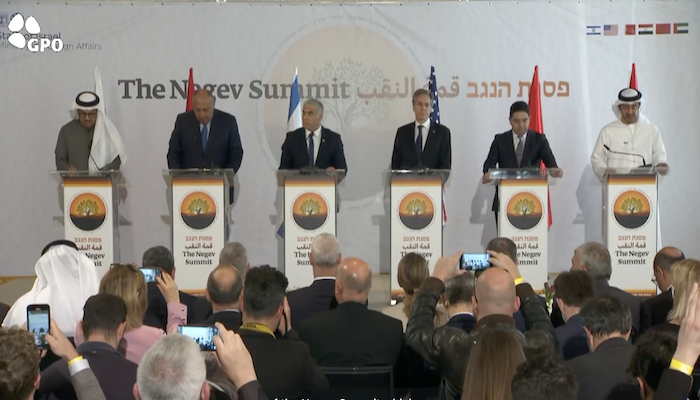IN THE MEDIA
An unprecedented summit highlights a changing Middle East
April 27, 2022 | Ahron Shapiro

An edited version of this article appeared in the Herald Sun on April 25
Amidst the backdrop of Russia’s invasion of Ukraine and reports that a new nuclear deal with Iran may be close, a completely unprecedented diplomatic event in Israel risks being overlooked entirely.
The five-way Negev Summit, held in Israel on March 27-28, saw the Jewish state hosting top diplomats from the United Arab Emirates, Bahrain, Morocco and Egypt, as well as US Secretary of State Antony Blinken.
As recently as June 2020, none of the UAE, Bahrain or Morocco had diplomatic relations with Israel. As Blinken told the Summit, “just a few years ago, this gathering would have been impossible to imagine.”
What happened at the historic meeting held in Sde Boker – the homestead and final resting place of Israel’s visionary first Prime Minister David Ben-Gurion – is part of a dramatic regional realignment.
But when it comes to Israel’s relations with a growing number of Arab countries in recent years, unprecedented is no longer unexpected. The 2020 Abraham Accords that ushered in an era of normalisation and cooperation between Israel and its regional Arab partners have proven both durable and dynamic, outlasting both the Israeli and US Administrations that helped launch them.
Egypt’s presence created a bridge between the older peacemaking paradigms forged between former enemies, and normalisation based on mutual interests and strategic alliances as represented by the forward-thinking Abraham Accords.
This bridge adds value in both directions. For Egypt, providing an opportunity to finally realise the potential of regional cooperation with Israel that failed to take root under the cold peace that has largely prevailed since their 1979 peace treaty. For the UAE, Bahrain and Morocco, populous Egypt, with its huge cultural influence across the region, is a traditional strategic keystone of Arab military and political power.
One key outcome of the Summit was the establishment of an ongoing mechanism for advancing shared interests. Working groups will be formed to focus on security, energy, tourism, health, education and food and water security, and to convene an annual summit to be hosted by participating countries on a rotating basis.
The Summit participants have not merely ceased to be antagonists – they are now allies in all but name. Moreover, Saudi Arabia, looming in the background, clearly gave its blessing to the meeting, and has been openly saying it now sees Israel as a “potential ally”.
That alliance is directed against the conventional and nuclear military threats, as well as the terrorism and other destabilising violence, emanating from Iran and its proxies. This growing Iranian threat weighed heavily on the timing of the meeting and was addressed in public remarks during the Summit. While there are some differences on how best to deal with Iran, all five countries agree Iran’s aggressive behaviours are the region’s most dangerous threat, requiring a serious, coordinated response.
This year, the UAE has endured deadly drone attacks from Iranian-backed Houthis in Yemen and Kataib Hezbollah in Iraq. Bahrain, whose neighbour Saudi Arabia greatly influences its foreign policy, is also well aware of the repeated Iranian-supplied drone attacks that country has suffered from the Houthis. Moreover, last November, Bahrain arrested a terrorist cell armed with weapons and explosives “sourced from Iran”.
Even Morocco – a distant 5,000 kilometres from Iran – hasn’t been immune from Iranian interference. Morocco’s Foreign Ministry has previously slammed “Iran’s involvement, through Hezbollah, in an alliance with the [Algerian] Polisario [Front] aimed at undermining Morocco’s security and its higher interests.”
One pressing issue that all Summit participants reportedly raised with Blinken was their shared opposition to mooted US plans to remove Iran’s Islamic Revolutionary Guard Corps, Teheran’s main vehicle for fomenting regional violence, from Washington’s list of terrorist groups as one of its concessions to Iran to gain a new nuclear agreement.
Indeed, the Negev Summit reflected continued realignments in a region increasingly distrustful of American reliability as an ally as the US continues to militarily disengage from the Middle East. Last year’s haphazard and chaotic US withdrawal from Afghanistan, and Washington’s repeated failures to respond to Iranian-sponsored attacks on oilfields and other strategic assets in the region, have only exacerbated such regional concern among traditional US allies.
This erosion of trust has cost America support in OPEC for its sanctions against Russia. Analysts say only OPEC members Saudi Arabia and the UAE have spare capacity to export more oil to ease a growing global supply crunch caused by sanctions on Russia – but have so far rebuffed Washington’s requests to increase supply, something they would have been unlikely to do even five years ago.
While maintaining ties with Washington, the Arab Negev Summit participants are increasingly looking to Israel, as a reliable neighbour with many shared interests, to assist where the US either can’t or won’t. It’s a natural development that foretells the likelihood of many more unprecedented moments in diplomacy between Arab states and Israel in coming years.





